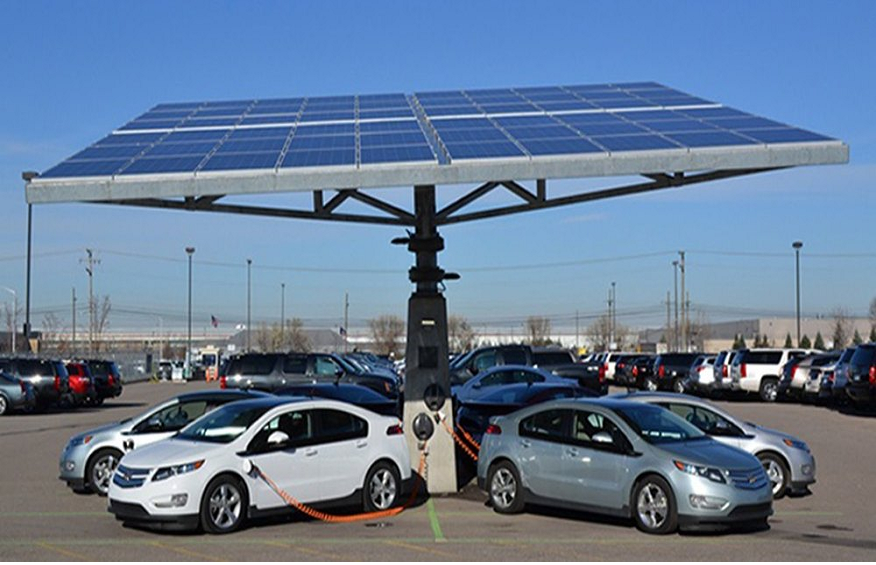Solar Power and EV Charging: The Future of Sustainable Transportation
7 min read
As the world continues to grapple with the challenges posed by climate change and the need to reduce greenhouse gas emissions, the transportation sector has emerged as a key area for sustainable solutions. Electric vehicles (EVs) are gaining popularity as a cleaner alternative to traditional gasoline-powered cars. Alongside the rise of EVs, solar power has emerged as a viable and environmentally friendly energy source. In this article, we will explore the synergies between solar power and EV charging and how they are shaping the future of sustainable transportation.
The Rise of Electric Vehicles
Electric vehicles have experienced a remarkable surge in popularity in recent years. This trend can be attributed to several factors, including advancements in battery technology, increased driving ranges, and a growing awareness of the environmental impact of traditional vehicles. EVs offer numerous benefits, such as lower emissions, reduced reliance on fossil fuels, and lower operating costs over the long term.
The Role of Solar Power in Sustainable Transportation
Solar power, harnessing energy from the sun, has emerged as a crucial component of sustainable transportation. Solar panels installed on residential, commercial, and industrial rooftops can generate clean electricity, which can then be used to charge EVs. Solar power offers several advantages:
1. Renewable and Sustainable: Solar power is a renewable energy source, meaning it will not deplete over time. By utilizing solar energy, we can significantly reduce our dependence on fossil fuels and decrease greenhouse gas emissions.
2. Cost-Effective: While the initial investment for installing solar panels can be substantial, the long-term benefits outweigh the costs. Solar power allows EV owners to charge their vehicles using free energy from the sun, reducing or eliminating the need to rely on traditional electricity sources.
3. Off-Grid Charging: Solar-powered EV charging stations can be set up in remote locations where traditional electricity infrastructure is unavailable or expensive to install. This enables EV owners to charge their vehicles in areas with limited access to power grids, expanding the reach of electric mobility.
Solar-Powered EV Charging Infrastructure
To make solar power and EV charging a seamless experience, a robust charging infrastructure is essential. Here are a few key aspects:
1. Solar-Powered Charging Stations: Dedicated EV charging stations equipped with solar panels can generate clean energy to power the charging infrastructure. These stations can be integrated into existing solar installations or designed as standalone units, providing green energy for EV owners.
2. Smart Grid Integration: Advanced technologies, such as smart grids, can optimize the utilization of solar power for EV charging. These systems intelligently manage energy flows, ensuring efficient use of solar energy and reducing strain on the grid during peak charging periods.
3. Battery Storage Solutions: Solar power generation is subject to variations due to weather conditions and daytime fluctuations. By combining solar panels with energy storage systems, excess energy can be stored and used for EV charging even during cloudy periods or at night, improving the reliability and availability of solar-powered charging.
Government Incentives and Policies
Governments around the world are recognizing the potential of solar power and EVs in mitigating climate change and reducing air pollution. Many countries have introduced various incentives and policies to accelerate the adoption of these technologies. These include tax credits, subsidies for solar installations and EV purchases, and regulatory measures promoting the development of solar-powered charging infrastructure.
Future Prospects and Conclusion
Solar power and EV charging represent a powerful combination in the transition to sustainable transportation. The future holds immense potential for further advancements in both technologies. As solar power becomes more efficient and affordable, and battery technology continues to improve, we can expect to see exponential growth in solar-powered EV charging infrastructure.
By leveraging solar power, we can not only reduce carbon emissions but also create a more decentralized and resilient energy system. As individuals, businesses, and governments embrace this synergy, we can drive the transition towards a cleaner and more sustainable future for transportation.
In conclusion, solar power and EV charging are transforming the way we move, offering a greener alternative to traditional transportation systems. Through their integration, we can build a more sustainable, low-carbon future where transportation and energy systems work hand in hand to combat climate change.
Frequently asked questions
1. What are solar panels?
2. How do solar panels work?
3. The pros and cons of a solar panel system?
4. What is battery storage?
5. Would I benefit from Battery Storage?
6. What’s the cost of a solar panel system with and without battery storage?
What are solar panels?
Solar panels, also known as photovoltaic (PV) panels, are devices that convert sunlight into electricity. They are typically made up of multiple solar cells, which are composed of semiconductor materials such as silicon. When sunlight hits the solar cells, the photons in the sunlight energize the electrons in the semiconductor material, creating an electric current. This current is then captured and harnessed for various applications, including powering homes, and businesses, and charging electric vehicles.
How do solar panels work?
The functioning of solar panels revolves around the photovoltaic effect. When sunlight strikes the surface of the solar panels, it excites the electrons in the semiconductor material, creating a flow of electric charge. The solar cells within the panels are interconnected in series and parallel configurations to achieve the desired voltage and current levels. The direct current (DC) electricity generated by the panels is then converted into alternating current (AC) electricity using an inverter, making it compatible with the electrical grid or usable within a building. This AC electricity can power electrical devices directly or be stored in batteries for later use.
The pros and cons of a solar panel system
Pros:
Renewable Energy Source: Solar panels harness energy from the sun, which is an abundant and renewable resource. This reduces dependence on finite fossil fuels, mitigates greenhouse gas emissions, and contributes to a more sustainable energy future.
Cost Savings: Installing solar panels can lead to significant long-term cost savings on electricity bills. Once the initial investment is recouped, solar energy is essentially free, as the panels generate electricity from sunlight without ongoing fuel costs.
Energy Independence: Solar panels provide an opportunity for homeowners and businesses to become more self-sufficient in meeting their energy needs. Generating electricity on-site reduces reliance on the grid and shields against rising energy prices.
Cons:
High Initial Cost: The upfront cost of installing solar panels can be a barrier for many individuals and businesses. While the prices have decreased over the years, the initial investment can still be substantial, requiring careful financial planning.
Weather Dependency: Solar panels rely on sunlight to generate electricity. Their efficiency is affected by weather conditions, such as cloudy or rainy days. This can result in fluctuations in energy production, necessitating alternative sources or energy storage systems during periods of low sunlight.
Space Requirement: A sufficient area of unshaded roof or ground space is necessary to accommodate solar panels. In densely populated urban areas, limited space may pose a challenge for installation.
What is battery storage?
Battery storage, also known as energy storage systems (ESS), refers to the technology that allows for the capture and storage of excess electricity generated by solar panels. Instead of exporting surplus energy to the grid, it can be stored in batteries for later use when solar production is low, such as during the night or cloudy days. Battery storage systems enable greater flexibility and control over energy usage, allowing homeowners and businesses to maximize self-consumption of solar energy and reduce dependence on the grid.
Would I benefit from Battery Storage?
The benefits of battery storage depend on individual circumstances and goals. Battery storage systems offer several advantages:
Increased Self-Consumption: By storing excess solar energy, battery systems enable homeowners and businesses to utilize more of their self-generated electricity, reducing the reliance on grid power and maximizing the benefits of solar panels.
Backup Power: In areas prone to power outages or unreliable grid infrastructure, battery storage provides a backup power supply. During blackouts, the stored energy in the batteries can be used to power essential appliances or keep critical systems running.
Time-of-Use Optimization: In regions with time-of-use electricity rates, battery storage allows users to draw power from the batteries during peak-rate periods when electricity prices are higher. This can lead to additional cost savings by avoiding expensive grid electricity during peak hours.
However, it’s important to consider factors such as the cost of the battery system, the local energy pricing structure, and the solar panel system’s energy production to determine if battery storage is economically viable and aligns with individual needs.
What’s the cost of a solar panel system with and without battery storage?
The cost of a solar panel system varies based on several factors, including the system size, quality of equipment, installation complexity, and location. Generally, a solar panel system without battery storage is less expensive compared to a system that includes battery storage.
As of 2023, the average cost of a residential solar panel system in Europe ranges from €4,000 to €10,000 per kilowatt (kW), depending on the aforementioned factors. For example, a typical 5 kW solar panel system might cost between €20,000 and €50,000 without battery storage.
The addition of battery storage increases the overall cost of the system. On average, battery storage systems can cost anywhere from €5,000 to €15,000 per kilowatt-hour (kWh) of storage capacity. For a residential system, the cost of a battery storage system can range from €10,000 to €30,000 or more, depending on the desired capacity and brand.
It’s important to note that while battery storage adds to the upfront costs, it can provide additional benefits such as energy independence, backup power, and greater control over electricity usage, which may justify the investment for some individuals or businesses.
Use the bountiful sunshine in Marbella to your advantage by installing solar panels to reduce your air conditioning costs. By harnessing solar energy, your home and AC systems will run on self-generated electricity, often producing surplus power which can lead to substantial savings on your energy bills. This isn’t just a green move – it’s a financially smart decision too.
If you’re on the hunt for the best Air Conditioning Marbella Spain has to offer, your search ends here. We offer solar-powered AC units that not only cool efficiently but also help you save considerably on energy costs. Get in touch with us today to explore this rewarding and eco-friendly option, and together, let’s make Marbella a leader in renewable energy usage and sustainability.







